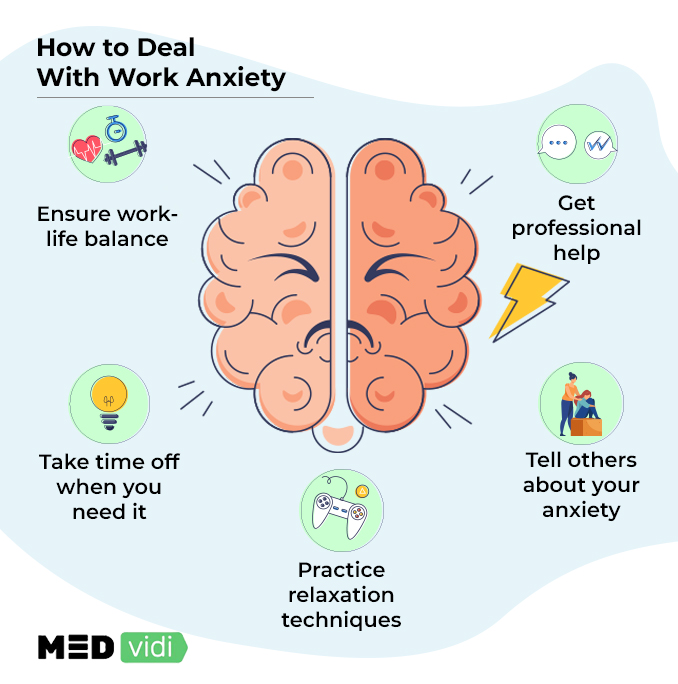Work-related stress that induces anxiety is referred to as work anxiety, or it can be an effect of an anxiety disorder at work. It’s common to experience overwhelm or stress at work from time to time owing to its intensity or even excessive dedication. However, persistent and recurrent stress is not normal and can have negative repercussions. It must be handled to prevent detrimental effects on both employees and companies.
Many people who struggle with anxiety become immune to the sensation. They might not realize their anxiety is out of control until it starts to interfere with their daily life or work specifically.
This post will walk you through recognizing your anxiety symptoms and finding solutions that make a difference.
Get first line treatment for anxiety from a health professional & lead a stress-free life.
What Are the Symptoms of Work Anxiety?
If your anxiety is only present when you are dealing with your job duties, and you feel less stressed once you leave, this is an indication that you are experiencing anxiety at work. If the triggering situations are diverse, it may be a sign of any anxiety disorder, and further examination is needed. Still, even non-job-related anxiety can affect your performance in the workplace.
Coming back to work anxiety or sensory overload at work, you may encounter the following symptoms:
- Avoiding new projects, meetings, and work events
- Having a lack of motivation
- Feeling pressure to perform perfectly
- Being bored with your responsibilities
- Frequently putting off duties linked to employment
- Having difficulty focusing or remembering things
- Experiencing bodily tension when performing work activities
In addition to the above, one may have issues falling asleep and avoid family or friends. They may also experience physical symptoms of headaches, body aches, stomach issues, fast heartbeat, and sweating palms. The anxiety symptoms usually become more severe in the mornings and ease till the evenings.
What Exactly Causes Work Anxiety?
The cause of work-related stress can vary from person to person. Some might have naturally sensitive personalities, while others may feel the need to be perfect. Common situations that can lead to workplace anxiety are the following:
- Difficulty managing work-life balance
- Issues at the workplace or with colleagues
- Problems meeting deadlines
- A lack of support
- Decreased performance due to external factors
- A lot of missed days at work
- Problems with giving presentations
How Does Work Anxiety Affect Your Life?
Work overload and anxiety due to work can affect your life in multiple ways, such as the following:
- Difficulty concentrating on important tasks
- Low job satisfaction
- Negative effects on your personal life
- Poor communication with colleagues
- Low performance at work
- Job loss
- Disturbed social life
Save yourself from the negative consequences of anxiety. Click the button below!
What’s Involved in Dealing With Anxiety at Work?
Anxiety is something that can be controlled. You can use various techniques to manage it and stop feeling overwhelmed. The following suggestions will assist you in this regard.
Relax Your Mind Before Working
Practice relaxation techniques before you start your day or work to aid mental relaxation and optimum work performance. Here are a few examples:
- Mindfulness techniques
- Breathing exercises
- Visualization exercises
- Progressive muscle relaxation (PMR)
Try to set aside 20 to 30 minutes, twice or three times every day, to work on these strategies. The more you practice, the better and more efficient you’ll get.
Even if you don’t immediately feel better, it’s crucial to continue applying these methods. Before you begin to experience the advantages, it will take time and consistent practice.

Tell Others About Your Anxiety
Whether or not you want to disclose your anxiety to others is entirely up to you. Still, sharing your fear and how it’s affecting your performance, though, could make it easier for others to comprehend how you’re feeling. Your worries can be outweighed by the advantages of notifying your management about your work anxiety. Additionally, you can share it with your coworkers or friends at the workplace. So, if you experience an anxiety attack in the future, someone will be there to help you calm down.
Get to know effective approaches to dealing with stress from mental health professionals.
Practice Self-care
Only a healthy body and mind can battle stress or overwhelming emotions. Make minor lifestyle adjustments to increase your energy and focus. Even simple changes like the following can make you feel stronger and more resilient:
- Exercise regularly or have long walks
- Eat healthily
- Set up sleeping routines and take a good amount of sleep
- Reduce your on-screen time
Ensure Work-life Balance
You can better control your anxiety and increase your productivity at work by finding a work-life balance or harmony. You can use a variety of time management techniques like the Pomodoro: it aids in increasing attention by creating working units for set periods (such as 25 minutes) and having short, frequent breaks.
Setting boundaries to keep your work-related concerns at work is another valuable tip. After work, spend some time with your loved ones and friends to unwind.
Take Some Time Off
It’s probably a good idea to take some rest if your workplace worries are making you tense. You can ask a doctor for a medical leave of absence or take a few days off. When you have free time, spend it engaging in relaxing or enjoyable activities. You can visit vacation destinations or stay at home and spend time with your family. But keep in mind to keep yourself free from any actions or concerns relating to your place of work.
Look for Better Opportunities
Everyone occasionally has work anxiety, but if your job is unsatisfactory and a consistent cause of worry, and nothing you have done has helped, it may indicate a more serious issue. Severe anxiety may indicate that the job or workplace is the problem. It’s not compulsory that the problem is within you. Your performance may also be impacted by the heavy workload, high expectations, inadequate pay, and hostile work environment. Discuss the issue with your employer to find a proper solution, but if the negotiations remain fruitless, it might be the time to look for better opportunities.
Get Professional Help
Professional support might be quite beneficial if you’re struggling with workplace anxiety. There is never a good or bad time to talk to a therapist. Depending on the patient’s condition and the severity of their symptoms, a doctor may recommend the following options:
Closure
Finding the best techniques for you may take some time because what works for one person might not work for another. But bear in mind, if managing your work anxiety is proving difficult, consider getting professional help. Your best option in this situation may be the professionals at MEDvidi clinic. Get in touch with us to receive the best online mental health care.













